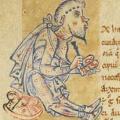116 - Charles Brittain on Augustine's "On the Trinity"
Posted on
In a final episode on Augustine, Charles Brittain joins Peter to discuss the theory of mind presented in "On the Trinity".
Themes:
Further Reading
• C. Brittain, "Non-Rational Perception in the Stoics and Augustine," Oxford Studies in Ancient Philosophy 22 (2002), 253-308.
• C. Brittain, "Augustine as a Reader of Cicero," in Tolle Lege: Essays on Augustine and Medieval Philosophy (Milwaukee: 2011), 81-114.
Charles Brittain's faculty webpage at Cornell.







Comments
Accessing comments on specific shows
Hi Peter,
Question--as I'm a bit flummoxed here.
I'm on the HoPwG page featuring Charles Brittain on Augustine, looking at the bottom of the page where it says "Add new comment" and, for now, "176 reads".
As I decided that my question for the episode was more theological than philosophical (Western Latin vs. Eastern Greek formulations on the Trinity: psychology vs. ontology) I decided to forego that question.
But I still wanted to read the reads. But this is not a link to take you to the comments of the specific episode. The Comments page at the top left of the menu bar doesn't seem to be the place to go either--though happy to know you are treating the Arabic tradition, esp. the Greek Plotinus vs. the Arabic one (yeah!).
But I would still enjoying perusing the comments to each show, including the now 257 reads. Hate to ask a stupid question for such a site, but where to I do that, without me having to do what I'm doing now--submitting a comment?
Thanks again,
Rhys
OKC, OK.
In reply to Accessing comments on specific shows by Rhys W. Roark
"Reads"
Actually "reads" just means page views i.e. how many people have looked at this page so far. (Up over 300 since you wrote!) Presumably that is more or less the same as the number of people who have listened to it online, give or take a few who navigated here and didn't listen, or came more than once. Actually yours is the first comment on this episode -- all the comments appear at the bottom of the page like this, so you won't miss them.
I agree "reads" is an odd term for it; it is a good example of the way we grasp for metaphors or references to older technologies to describe this whole internet thing ("surfing" is another example).
Peter
In reply to "Reads" by Peter Adamson
Reads
Thanks Peter.
Now I get it.
What about "views" or "page views" as a term?
Or, if you want to really flatter your audience "lovers of wisdom who have viewed this page" (or "people who like thinking who . . . ," "fans of Peter Adams who . . . ," "the Illuminati who . . . ," or various combos thereof . . . )
But nice to be in the clear: "reads" = "views"
Rhys
OKC. OK
St.augistine influence on Ralph Waldo Emerson
Is there any influence of St.Augustine on Ralph Waldo Emerson especially his essay the oversoul? Or i am just making relations when there is real none.
In reply to St.augistine influence on Ralph Waldo Emerson by Yousef damra
Augustine and Emerson
I had no idea so I "asked the audience" on Twitter and someone came up with two helpful pointers. This page:
http://www.emersoncentral.com/circles.htm
has Emerson actually quoting Augustine, and also the Stanford Encyclopedia:
http://plato.stanford.edu/entries/emerson/
confirms that Augustine is one of the authors he frequently quotes. Which is not entirely surprising, but it suggests your guess is probably correct. It will be fun to cover Emerson on HoPWaG when I get to him!
In reply to Augustine and Emerson by Peter Adamson
Thanks
Thanks for letting me know that am not a total idiot, and I will be waiting for an episode for Emirson in few years.
Got it.
Ok. I think I finally understood the concept of trinity. Augustine seems to have been a genius, to build such a profound philosophical foundation for a rather theological concept.
Broken weblink
The link for Cornell project on Philosophy of Augustine is broken so that it gives the following error when I click it :
"The requested page "/research/aug_project.cfm" could not be found."
I am curious about the Cornell project and tried to google about it but without any luck. Can you please share the details of the project?
In reply to Broken weblink by Deepanshu Maheshwari
Weblink
Thanks for pointing that out - I guess the project has no presence on their website anymore. I'll take the link down.
Add new comment